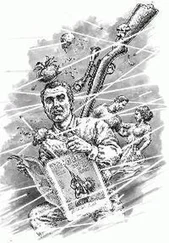Аврам Дэвидсон - Peregrine - primus
Здесь есть возможность читать онлайн «Аврам Дэвидсон - Peregrine - primus» весь текст электронной книги совершенно бесплатно (целиком полную версию без сокращений). В некоторых случаях можно слушать аудио, скачать через торрент в формате fb2 и присутствует краткое содержание. Год выпуска: 1971, ISBN: 1971, Издательство: New York : Walker, Жанр: sf_all, на английском языке. Описание произведения, (предисловие) а так же отзывы посетителей доступны на портале библиотеки ЛибКат.
- Название:Peregrine : primus
- Автор:
- Издательство:New York : Walker
- Жанр:
- Год:1971
- ISBN:0802755461
- Рейтинг книги:5 / 5. Голосов: 1
-
Избранное:Добавить в избранное
- Отзывы:
-
Ваша оценка:
- 100
- 1
- 2
- 3
- 4
- 5
Peregrine : primus: краткое содержание, описание и аннотация
Предлагаем к чтению аннотацию, описание, краткое содержание или предисловие (зависит от того, что написал сам автор книги «Peregrine : primus»). Если вы не нашли необходимую информацию о книге — напишите в комментариях, мы постараемся отыскать её.
Peregrine : primus — читать онлайн бесплатно полную книгу (весь текст) целиком
Ниже представлен текст книги, разбитый по страницам. Система сохранения места последней прочитанной страницы, позволяет с удобством читать онлайн бесплатно книгу «Peregrine : primus», без необходимости каждый раз заново искать на чём Вы остановились. Поставьте закладку, и сможете в любой момент перейти на страницу, на которой закончили чтение.
Интервал:
Закладка:
Peregrine wondered somewhat at the man’s inmost thoughts, one stranger to another. “What is your name?” he asked. “And where do you think to go?”
“My name, sir, is Serverus . . . Where does the young sir think to go?”
The offer was plain. Peregrine, looking at the man, suddenly felt that it was not unwelcome. “This yonder road. Captain Serverus . . . Might it lead, perhaps, do you think, eventually to the great northern forests?”
“Sir, it might well, for they lie in that approximate direction, as 1 have heard.”
Peregrine’s horse began to move a trifle restlessly, and he gentled it. “And . . . Captain . . . might it lead, perhaps, so you think, eventually to a sea? And to which one?”
White lines came and went around the eyes of Serverus as he frowned in thought. “It probably would, sir, take one thing with another. Which one? I think to that same sea the Greeks cried out at — which is strange, seeing that the road heads north, though not true north, and Persia must lie to the south as well as to the east. Its name would be that Euxine Sea, which some call Black.”
Peregrine opened the saddlebag on his right side and needed not to look whither his hand groped. “If you will come with me, then, Captain Serverus ... if you will chance the trackless forest and the equally trackless sea . . . discharge your duties at this present post, presently. The new Caesar will not, I think, grudge me yourself. —Nor, for that matter, would he grudge me a lance for my pennant . . . That one in your hand will do, I think. The banneret itself you may return when you return to discharge yourself.”
The discharge did not take long. The second in command made no objection, naturally enough, and took from Peregrine a short note explaining matters to Darlangius; and asking that Serverus’s back pay be commuted into land and administered by The Purple until such time as Serverus would return . . . or . . . whatever . . .
“All carried out and in order, sir,” said the new captain of his troop. “What is your first order, sir?”
Peregrine handed him a piece of cloth. “My own banneret and pennant,” he said. “Fasten it to the lance-pole, Captain, and carry it yourself this first mile: and perhaps many miles, indeed, further.”
The rugged" face of the officer folded into lines of concentra
tion. His hands, scarred in more places than one, were deft and quick. “Our banner, sir,” he said. It took the fresh wind and whipped out that all might see.
Peregrine said, “Onward, then. North, and north by east. By road, by forest, and by Sea ... by forest and by Sea.”
And another voice spoke, close, close to his ear, spoke low, but was heard nonetheless above the sound of clinking gear and horse-hooves; it was the voice of Julianus. “ ‘Behold the Ram of God,’ ” he said, his head indicating the black figure of Ammon on the white weft. “ ‘Behold the Ram of God, which taketh away the sins of the world . . .’ ”
t t t t
Now and then they met upon the road a party of woodcutters, saw the occasional smoke of a charcoal burnery. And huntsmen they saw, such as seek the yellow-deer, or red. But women and children they saw not. Plane-trees and poplars were often along the road, and beyond it in the second growth of timber, springing up on the abandoned farms, were trees unfamiliar to Peregrine. He turned to his man, riding always close to him, asked, “Those words you said, Julianus, when you first saw my pennon —what do they mean to you?”
It seemed to him that his question made the man rather uneasy than not, but his answer came without hesitation. “Lord, once, when I was younger, I served some monks in a distant cloister which contained a number of ikons of fame and virtue. There came to us once, in the dark of night, some men who were mounted. Several stayed back, in the darkness, and even the one who rode closer kept his face muffled in his cloak . . .”
“Yes,” said Peregrine, softly. “Yes ... yes ... Go on.”
The account was a short one. The rider had asked to be shown “the Black Lady”, a request not very welcome (as it seemed) to the abbot. There was indeed an ikon, a Madonna, the abbot conceded. But he preferred to delay opening the chapel until the next day, the nocturnal prayers being said according to custom in the main church. And, further, the abbot straightly declared, the Madonna was dark merely because the resin-treated oil with which she had been painted had darkened with age. This expla
AVRAM DAVIDSON
[ 169 ]
nation and its suggestion of delay did not please the rider.
‘She is our Lady, Queen of the Dark Heavens of the Night,’ ” he had said, “ ‘and of the Dark Earth. Lady of the Black Soil is She, and of the Black Skies and Seas. As is She, so is Her Son: and black are they, and beautiful.’
“And the abbot, trembling, yet still staunch, declared, ‘What you say is not heresy alone, it is blasphemy. And,’ ” here he went for the chapel, fumbling for the key, “ ‘And in Her shall I take refuge from your unholy words, Let me hear no more of that. Let your veneration be silent and brief.’ ” He had thrown open the doors, gone to the ikonostasis, removed the image and held it up, murmuring prayers. And all the riders had bowed low upon their mounts, and had said their own prayers, also low.
“Then,” said Julianus, “They galloped away, to our old abbot’s great relief and to those of his monks—and, I admit—to mine as well. But as they went, one I saw who carried a pennon on a lance, and if it was not the very one which Captain Serverus carries now, then it was its model: and certain it is that I heard him say as he flourished it and before the darkness swallowed him, those words which came to my mind and to my mouth as I saw this pennon which is now ours. —Now, my lord, this is but all I know; and if in relating it I have given any offense, for this I am heartily sorry, and forgiveness I do beg and crave for it.”
“There being no offense, there is no need for a forgiveness.”
Sempronius, who had been riding somewhat nearer than usual, seeing now that the conversation was at an end, approached. “If it please Your Honor,” he said, “if I am to serve your Honor’s supper as it should be served, I must be able to see to it that the cook-fires are lighted in time for good beds of coals to build.” Peregrine had not been particularly keen on having Sempronius along, but Darlangius had urged him to do so. Peregrine would be riding in high estate, said Caesar, and would find his way eased accordingly: he would, as part of this estate and ease, be receiving entertainments—therefore he would have to return them.
“He’s a fat futz,” said Caesar, definitively, “but he knows how to handle these things, and, after all, you don’t have to snuggle, cuddle, or bundle with him. If the soup isn’t entirely to your liking, throw it at him. He’ll like that. Shows him he’s doing for a Teal gentleman. There are no snobs like servant
snobs.”
The troop pitched camp. Serverus set up a perimeter of defense, Sempronius had his cook-fires started and, whilst they were still too high for cooking over, Julianus heated his master’s bath water. Peregrine was bathed and anointed and changed his clothes. A small tray of thirsteners was served, then warm water was mixed with wine and poured for him. He sat on a camp chair in front of his tent and sipped from the goblet and marvelled at how things had come to pass, how changed his fortunes. Lamps were presently lit, supper was served, and served splendidly. Peregrine walked about a bit afterwards, then he retired and read in the Histories of Herodotus. Vaguely he was aware of laying the scroll aside, of Julianus first covering him with soft blankets, then blowing out the lamps and snuffing the glowing wicks with moistened fingers, and—more vaguely yet—of Julianus composing himself at the foot of his camp-bed. And then he fell asleep. And slept soundly.
Читать дальшеИнтервал:
Закладка:
Похожие книги на «Peregrine : primus»
Представляем Вашему вниманию похожие книги на «Peregrine : primus» списком для выбора. Мы отобрали схожую по названию и смыслу литературу в надежде предоставить читателям больше вариантов отыскать новые, интересные, ещё непрочитанные произведения.
Обсуждение, отзывы о книге «Peregrine : primus» и просто собственные мнения читателей. Оставьте ваши комментарии, напишите, что Вы думаете о произведении, его смысле или главных героях. Укажите что конкретно понравилось, а что нет, и почему Вы так считаете.






